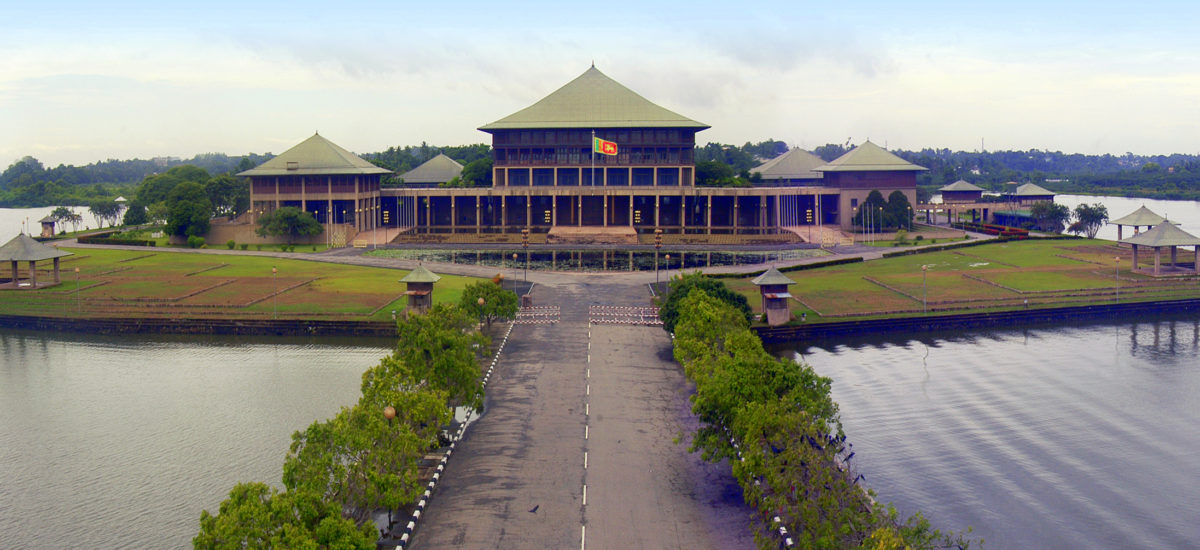Featured image courtesy NewsFirst
At least 10 petitions challenging the Presidential proclamation to dissolve Parliament and call for general elections were filed before the Supreme Court on November 12.
Among the respondents were political parties, members of civil society and Attorneys-at-Law. UNP MPs Ajith P Perera, Kabir Hashim and Harsha de Silva, JVP Leader Anura Kumara Dissanayake, TNA MP R Sampanthan, ACMC MP Rauff Hakeem and DPF Leader Mano Ganesan were among those who filed petitions.
The Attorney-General’s Department said that notice had not been filed to all parties. However, given arguments that the petitions being heard were of “grave urgency” hearings began at 2 pm. A three-judge bench consisting of Chief Justice Nalin Perera, Justice Priyantha Jayawardena and Justice Prasanna heard the cases.
In a surprising move, Elections Commissioner Professor Ratnajeevan Hoole also filed a petition challenging the Presidential proclamation.
In his petition, received by Groundviews, Prof. Hoole noted that Article 70(1) of the Constitution placed restrictions on the President’s power to dissolve Parliament. He added that as a Commissioner he could not turn a blind eye to the illegality in the context of his solemn duty to ensure free, fair and lawful elections.
Prof. Hoole also asked for interim relief until the Supreme Court decided on the petitions given the financial burden that elections would have on political parties and the general public. Fellow Commissioner Mahinda Deshapriya earlier estimated that Parliamentary elections could cost up to Rs. 4 to 5 billion.
Presidents Counsel K. Kanag-Isvaran who appeared for TNA MP R Sampanthan made the argument that article 33 (2) (c ) which gives the President the power to dissolve Parliament is only an empowerment, and not a stand-alone provision. There are other provisions in the Constitution that influence its meaning, which need to be followed, Kanag-Isvaran said.
Former Attorney General Tilak Marapana made the argument that even if 33 (2) was taken as a stand alone provision, the act of dissolution has to be done reasonably and not for a collateral purpose as the President had done in this instance.
Others who filed petitions said that the Constitution had to be read holistically. In explaining the rules of constitutional interpretation, President’s Counsel Dr Jayampathy Wickramaratne said that intention of the framers of the law must be acknowledged, and that the law must be interpreted harmoniously with those intentions.
Presidents Counsel J C Weliamuna noted that the 19th Amendment increased the powers of Parliament, which in turn had the direct mandate of the people. “Lawyers take an oath to defend the Constitution at a time when sun is setting on it,” Weliamuna said. He added that procedure had to be followed in dissolving Parliament even if before its term ended i.e. by re-convening sittings and gaining the approval of a two-thirds majority.
Some of the petitioners highlighted the impact that the Presidential proclamation had. Counsel Viran Corea appearing for the Centre for Policy Alternatives and Executive Director Dr Paikiasothy Saravanamuttu said that the right to franchise of voters had been affected.
“Article 70(1) of the Constitution of Sri Lanka read with Articles 33(2)(c) make it crystal clear that the President only has the power to dissolve Parliament once four years and six months have elapsed since the first sitting of the current Parliament, or if two thirds of Members of Parliament pass a resolution requesting dissolution. Since neither of these two conditions have been met, the President’s Proclamation is invalid,” a statement released by CPA shortly after the petition was filed noted.
Presidents Counsel G Alagaratnam noted the impact that the proclamation had had on the economy and the entire country. He also contended that the law could not be read in isolation or in a way that could lead to absurdity. If this proclamation were deemed legal it could then be possible for the President to dissolve Parliament the very day after it had been elected, he noted.
Counsel M A Sumanthiran argued that while there are checks and balances between each organ of government, one could not extinguish the other in this manner. He added that the act of dissolution was void from the beginning (void ab initio), and that any action that arose from it, such as the calling of General elections, was therefore illegal. In addition, Sumanthiran said that reading the Constitution in a way that only considered stand-alone provisions could lead to major abuse of power, as it would allow the President to prorogue Parliament indefinitely, without abiding by the limitations in Article 70.
Court adjourned at 5:30 pm with hearings set to continue on November 13, from 10 am, following the Attorney-General’s request for more time to make submissions.
Download this as a PDF here.
For more updates on the current situation, click here.

